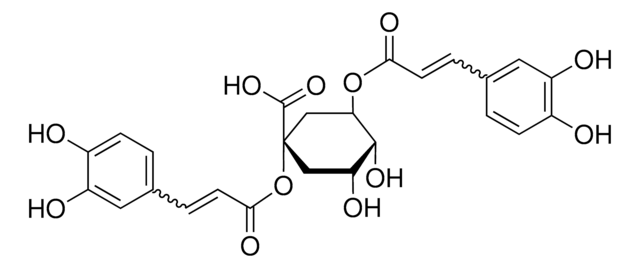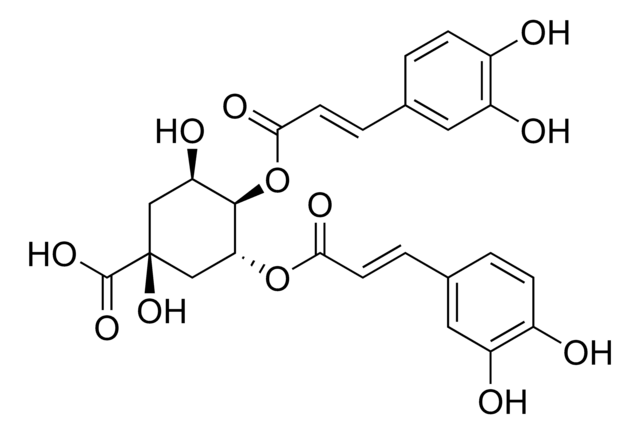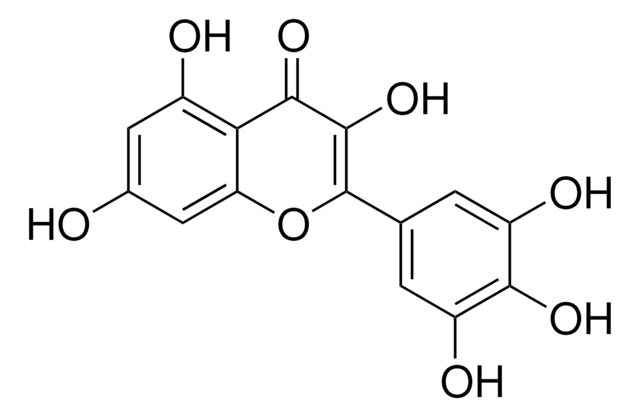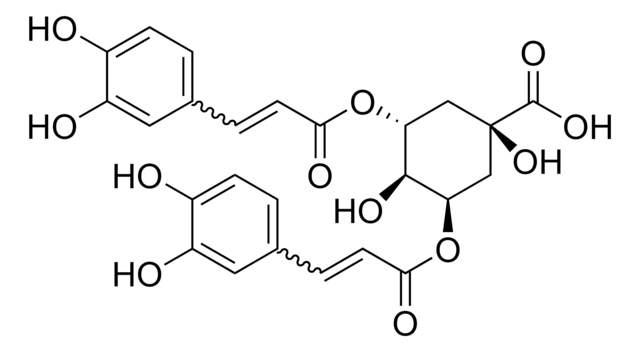Wichtige Dokumente
SBR00002
Arzanol
from Helichrysum italicum, ≥98%
Synonym(e):
3-[[3-Acetyl-2,4,6-trihydroxy-5-(3-methyl-2-buten-1-yl)phenyl]methyl]-6-ethyl-4-hydroxy-5-methyl-2H-pyran-2-one
About This Item
Empfohlene Produkte
Biologische Quelle
Helichrysum italicum
Qualitätsniveau
Assay
≥98%
Form
powder
Anwendung(en)
metabolomics
vitamins, nutraceuticals, and natural products
Lagertemp.
−20°C
SMILES String
OC1=C(CC2=C(O)C(C)=C(CC)OC2=O)C(O)=C(C(C)=O)C(O)=C1CC=C(C)C
InChI
1S/C22H26O7/c1-6-16-11(4)18(24)15(22(28)29-16)9-14-19(25)13(8-7-10(2)3)20(26)17(12(5)23)21(14)27/h7,24-27H,6,8-9H2,1-5H3
InChIKey
ZOIAPLVBZQQHCG-UHFFFAOYSA-N
Allgemeine Beschreibung
Anwendung
Biochem./physiol. Wirkung
Arzanol inhibits the activation of inflammatory transcription factor NFκB, HIV replication in T cells, releases of IL-1β, IL-6, IL-8, and TNF-α,and biosynthesis of PGE2 by potentially inhibiting the mPGES-1 enzyme.
Arzanol inhibits the activation of inflammatory transcription factor nuclear factor-KB (NF-KB), human immunodeficiency virus (HIV) replication in T cells, releases of interleukin (IL)-1β, IL-6, IL-8, and tumor necrosis factor (TNF)-α and biosynthesis of prostaglandin E2 (PGE2) by potentially inhibiting the mPGES-1 enzyme. It also possesses antioxidant and cytotoxic activity.
Rekonstituierung
Lagerklassenschlüssel
11 - Combustible Solids
WGK
WGK 3
Flammpunkt (°F)
Not applicable
Flammpunkt (°C)
Not applicable
Hier finden Sie alle aktuellen Versionen:
Analysenzertifikate (COA)
Die passende Version wird nicht angezeigt?
Wenn Sie eine bestimmte Version benötigen, können Sie anhand der Lot- oder Chargennummer nach einem spezifischen Zertifikat suchen.
Besitzen Sie dieses Produkt bereits?
In der Dokumentenbibliothek finden Sie die Dokumentation zu den Produkten, die Sie kürzlich erworben haben.
Unser Team von Wissenschaftlern verfügt über Erfahrung in allen Forschungsbereichen einschließlich Life Science, Materialwissenschaften, chemischer Synthese, Chromatographie, Analytik und vielen mehr..
Setzen Sie sich mit dem technischen Dienst in Verbindung.







